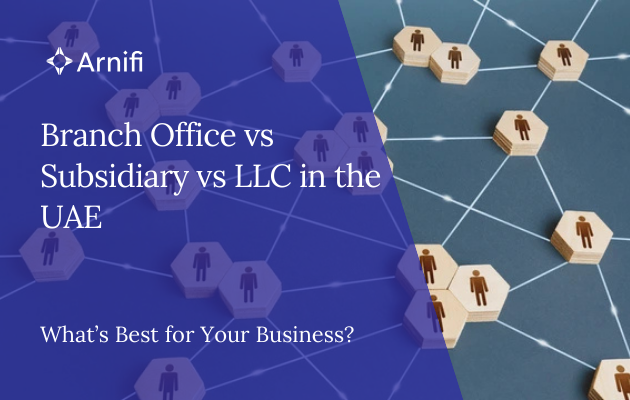Branch Office vs Subsidiary vs LLC in the UAE: What’s Best for Your Business?
by Shethana Apr 25, 2025  4 MIN READ
4 MIN READ

This is a common question we receive from founders, CFOs, and expansion teams looking to enter the UAE market. It’s a great one—because the legal structure you choose impacts everything from your operational freedom and tax exposure to the kind of activities you can undertake and how investors view your business. Let’s break it down.
1. Branch Office – An Extension of the Parent Company
Definition: A Branch Office is not a separate legal entity—it is an extension of your foreign (parent) company. It carries out business in the UAE under the name and full liability of the parent entity
Pros:
100% Foreign Ownership: No local equity partner needed.
- Full Control: Operates under the parent company’s full control and policies.
- Ease of Repatriation: Profits can be easily repatriated since there is no shareholding structure.
- Familiarity for Multinationals: Often used by larger firms for cost centers, marketing offices, or government contracting.
Cons:
- Limited Scope of Activities: Can only perform activities similar to the parent company’s scope.
- No Separate Legal Identity: Parent company bears full liability for actions taken by the branch.
- Requires a Local Service Agent (LSA): Although they don’t hold equity or control, an LSA is required in mainland setups.
- No Commercial Trading: Typically not allowed to conduct trading activities or product sales (unless through specific licenses or Free Zones).
2. Subsidiary: A Locally Incorporated Company
Definition – A Subsidiary is a legally independent company formed in the UAE, with its own identity and liability. It can be wholly or partly owned by a foreign parent.
Pros:
- Separate Legal Entity: Shields the parent company from liability.
- Greater Flexibility: Can engage in a wider range of business activities—even those different from the parent company.
- Investor–Friendly: Easier to raise funds, open bank accounts, or onboard partners locally.
- Tax Benefits: Can benefit from UAE’s tax treaties and corporate structure optimization.
Cons:
- Slightly More Complex Setup: Involves registration, documentation, and local regulations depending on activity.
- Regulatory Compliance: Must comply with local labor laws, ESR, UBO, VAT, and (as of June 2023) 9% Corporate Tax.
- Minimum Capital Requirements: May apply based on jurisdiction and activity.
3. Limited Liability Company (LLC): A Flexible Local Entity
Definition – An LLC is the most popular form of company in the UAE, offering a flexible structure for both foreign and local investors. It can act as a Subsidiary or be the initial standalone entity.
Pros:
- Widely Accepted Structure: Trusted by banks, government bodies, and local clients.
- No Restrictions on Activities (Mainland): Can conduct most commercial, industrial, and professional services.
- Local Market Access: Can work directly with UAE customers and government clients.
- No Currency Restrictions: Free movement of funds and profits.
Cons:
- Corporate Tax: A 9% tax applies on profits over AED 375,000 annually.
- Compliance Requirements: Needs to maintain books, file tax returns, and adhere to corporate governance rules.
- Costs: Slightly higher ongoing costs (audit, office space, visas) vs. a branch or Free Zone company
Which One Should You Choose?
| Criteria | Branch Office | Subsidiary |
| Legal Identity | Same as Parent | Separate Entity |
| Liability | Parent Company | Local Subsidiary |
| Activity Scope | Must match parent | More flexible |
| Trading Allowed | Depends of the Business type | Yes |
| Ownership | 100% Foreign | 100% Foreign possible in many sectors |
| Tax Exposure | Corporate Tax | Corporate Tax |
| Banking Ease | Moderate | Higher trust level |
| Setup Speed | Faster | Moderate |
Final Thoughts
If your Finance team recommends a Branch Office, it might be for cost efficiency or internal alignment. However, it’s essential to weigh that against business flexibility, operational freedom, and long-term risk.
A Subsidiary or LLC, while slightly more involved to set up, provides you with full autonomy, a broader scope of activities, and cleaner liability separation.
Need a tailored recommendation?
At Arnifi, we specialize in helping foreign companies navigate the legal and practical realities of setting up in the UAE, Saudi Arabia, and beyond. We’ll assess your business model, expansion goals, and internal needs to recommend the most effective structure for your company.
Top UAE Packages

Related Articles
Top UAE Packages



